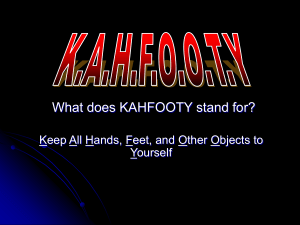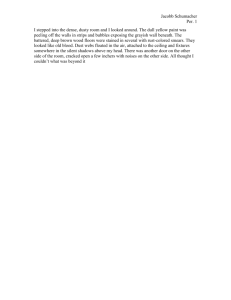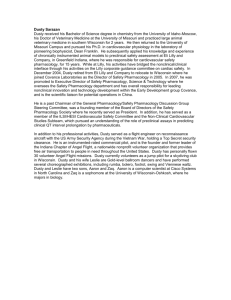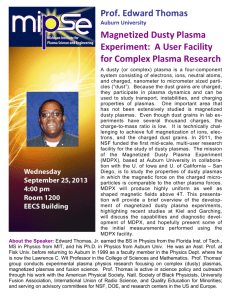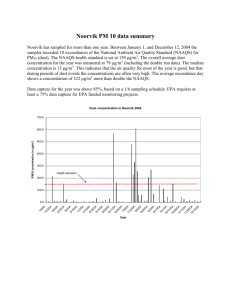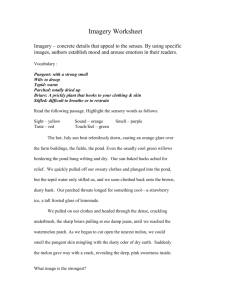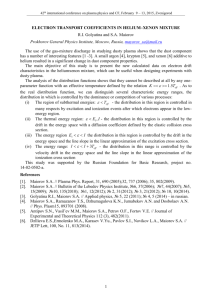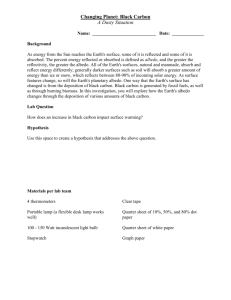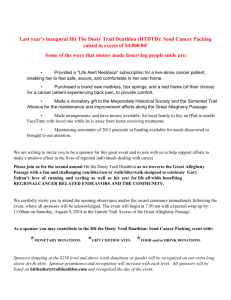While it can be argued that pop fans were not well served by the
advertisement
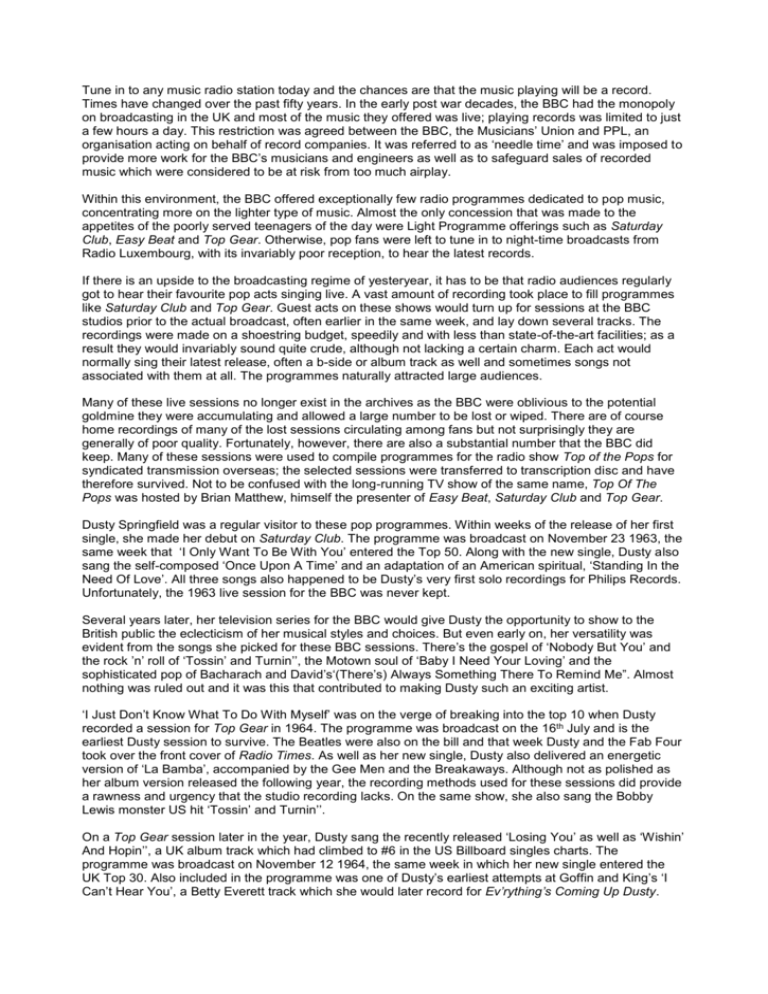
Tune in to any music radio station today and the chances are that the music playing will be a record. Times have changed over the past fifty years. In the early post war decades, the BBC had the monopoly on broadcasting in the UK and most of the music they offered was live; playing records was limited to just a few hours a day. This restriction was agreed between the BBC, the Musicians’ Union and PPL, an organisation acting on behalf of record companies. It was referred to as ‘needle time’ and was imposed to provide more work for the BBC’s musicians and engineers as well as to safeguard sales of recorded music which were considered to be at risk from too much airplay. Within this environment, the BBC offered exceptionally few radio programmes dedicated to pop music, concentrating more on the lighter type of music. Almost the only concession that was made to the appetites of the poorly served teenagers of the day were Light Programme offerings such as Saturday Club, Easy Beat and Top Gear. Otherwise, pop fans were left to tune in to night-time broadcasts from Radio Luxembourg, with its invariably poor reception, to hear the latest records. If there is an upside to the broadcasting regime of yesteryear, it has to be that radio audiences regularly got to hear their favourite pop acts singing live. A vast amount of recording took place to fill programmes like Saturday Club and Top Gear. Guest acts on these shows would turn up for sessions at the BBC studios prior to the actual broadcast, often earlier in the same week, and lay down several tracks. The recordings were made on a shoestring budget, speedily and with less than state-of-the-art facilities; as a result they would invariably sound quite crude, although not lacking a certain charm. Each act would normally sing their latest release, often a b-side or album track as well and sometimes songs not associated with them at all. The programmes naturally attracted large audiences. Many of these live sessions no longer exist in the archives as the BBC were oblivious to the potential goldmine they were accumulating and allowed a large number to be lost or wiped. There are of course home recordings of many of the lost sessions circulating among fans but not surprisingly they are generally of poor quality. Fortunately, however, there are also a substantial number that the BBC did keep. Many of these sessions were used to compile programmes for the radio show Top of the Pops for syndicated transmission overseas; the selected sessions were transferred to transcription disc and have therefore survived. Not to be confused with the long-running TV show of the same name, Top Of The Pops was hosted by Brian Matthew, himself the presenter of Easy Beat, Saturday Club and Top Gear. Dusty Springfield was a regular visitor to these pop programmes. Within weeks of the release of her first single, she made her debut on Saturday Club. The programme was broadcast on November 23 1963, the same week that ‘I Only Want To Be With You’ entered the Top 50. Along with the new single, Dusty also sang the self-composed ‘Once Upon A Time’ and an adaptation of an American spiritual, ‘Standing In the Need Of Love’. All three songs also happened to be Dusty’s very first solo recordings for Philips Records. Unfortunately, the 1963 live session for the BBC was never kept. Several years later, her television series for the BBC would give Dusty the opportunity to show to the British public the eclecticism of her musical styles and choices. But even early on, her versatility was evident from the songs she picked for these BBC sessions. There’s the gospel of ‘Nobody But You’ and the rock ’n’ roll of ‘Tossin’ and Turnin’’, the Motown soul of ‘Baby I Need Your Loving’ and the sophisticated pop of Bacharach and David’s‘(There’s) Always Something There To Remind Me”. Almost nothing was ruled out and it was this that contributed to making Dusty such an exciting artist. ‘I Just Don’t Know What To Do With Myself’ was on the verge of breaking into the top 10 when Dusty recorded a session for Top Gear in 1964. The programme was broadcast on the 16th July and is the earliest Dusty session to survive. The Beatles were also on the bill and that week Dusty and the Fab Four took over the front cover of Radio Times. As well as her new single, Dusty also delivered an energetic version of ‘La Bamba’, accompanied by the Gee Men and the Breakaways. Although not as polished as her album version released the following year, the recording methods used for these sessions did provide a rawness and urgency that the studio recording lacks. On the same show, she also sang the Bobby Lewis monster US hit ‘Tossin’ and Turnin’’. On a Top Gear session later in the year, Dusty sang the recently released ‘Losing You’ as well as ‘Wishin’ And Hopin’’, a UK album track which had climbed to #6 in the US Billboard singles charts. The programme was broadcast on November 12 1964, the same week in which her new single entered the UK Top 30. Also included in the programme was one of Dusty’s earliest attempts at Goffin and King’s ‘I Can’t Hear You’, a Betty Everett track which she would later record for Ev’rything’s Coming Up Dusty. At a BBC session for Saturday Club broadcast on July 17 1965, Dusty again sang ‘I Can’t Hear You’ but with a noticeably different treatment to her previous rendition. She also performed her new single ‘In The Middle Of Nowhere’ and duetted with Douggie Reece, bass guitarist of The Echoes, on Charlie and Inez Foxx’s ‘Mockingbird’. It’s quite possible that Dusty didn’t record another session for Saturday Club until January the following year. Although she had been booked to appear on the programme in October 1965, she had to cancel owing to engagements in the States. The edition broadcast on January 29 1966 included her brand new single ‘Little By Little’ and Little Stevie Wonder’s ‘Up Tight (Everything’s Alright)’. In the ballad department, she chose another Betty Everett song, ‘Chained To A Memory’ (the b-side to ‘Getting Mighty Crowded’), which Dusty subsequently recorded for her 1967 album Where Am I Going? It was only another three months before Dusty’s next session for the BBC, an edition of Saturday Club broadcast on April 16, Dusty’s birthday. The session is notable for ‘You Don’t Have To Say You Love Me’ which is in all probability the only surviving live recording of Dusty’s performance of the song before it reached number one. She also sang ‘We’re Doing Fine’ (recorded by Dionne’s much underrated sister, Dee Dee Warwick), Carla Thomas’s ‘Every Ounce Of Strength’ (the song on the b-side of Dusty’s new single) and the Young Rascal’s US chart topper ‘Good Lovin’’. With Dusty spending more time abroad in pursuit of international stardom, her appearances in the UK became less frequent and it’s unlikely that she was involved in any similar sessions until the Dave Lee Travis show in January 1970. In the brief interview that accompanied this session on the Top of the Pops transcription disc (replacing the original DLT interview), Brian Matthew commented on how long it had been since Dusty was in a sound radio studio (sic). There were originally four songs in the DLT session but ‘A Brand New Me’ met the same fate as the original interview. One of the three remaining songs was the Bee Gees’ self-penned hit ‘To Love Somebody’ which Dusty had only recently recorded with Jerry Wexler for the Atlantic label. In time, the Atlantic recording would be destroyed before it was ever released so it’s fortunate that there is at least one Dusty recording of this song that has survived. Dusty also sang ‘Son-of-a Preacher Man’, her UK/US top 10 hit from the previous year, and Jackie Wilson’s rousing ‘Higher And Higher (Your Love Keeps Lifting Me)’. By late 1970, Dusty was spending much of her time in the States and had all but given up on performing in the UK. Except for the occasional TV guest appearance and a few sporadic single releases that she rarely promoted, she could have been on the moon as far as the British public was aware. In late 1970, she sang three songs live for a Dave Cash Show when she returned to Britain to promote ‘How Can I Be Sure’ but there is no evidence that these recordings still exists. It appears therefore that the Dave Lee Travis programme is the most recent Dusty session to be kept by the BBC as well as among the last that she ever recorded. To complete this compilation, there are three offerings from the Springfields. The first two come from a July 1962 Russ Conway radio show and include their first ever single ‘Dear John’ as well as their latest release, ‘Swahili Papa’. Neither song was a hit but ‘Say I Won’t Be There’, the third Springfields number on this CD which they performed on a Ken Dodd radio show in July 1963, was one of their biggest selling singles and reached #5 in the UK charts. While in a perfect world all the sessions Dusty recorded for the BBC would have been kept, we have to be thankful that at least some of them have survived. All in all, this set offers a good insight into Dusty’s radio work in her heyday and is a worthy addition to the musical legacy that Dusty has left behind. Paul Howes November 2006 Author: The Complete Dusty Springfield (now revised and expanded) For details regarding the Dusty Springfield Bulletin magazine, please write to Paul Howes, PO Box 203, Cobham, Surrey KT11 2UG, England.
